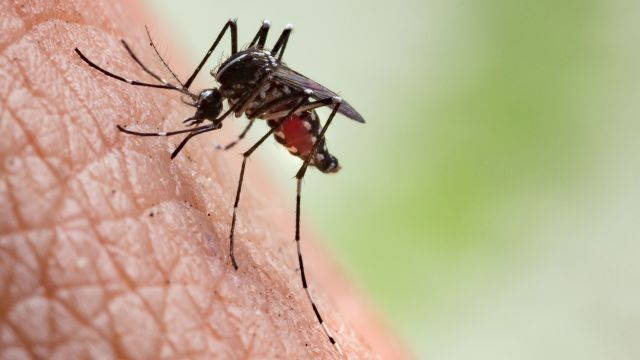Updated on June 27, 2024.
During the sultry months of summer, mosquitoes are usually just a nuisance when you spend time outdoors. But when they hold the potential to pass on serious diseases, mosquitoes become more than mere annoyances.
You may have heard of malaria and Zika virus, but have you heard of West Nile virus?
If you haven’t, you may want to pay attention, because the mosquito-borne illness—which only 19 years ago was confined to one corner of the country—has now been found in all 48 contiguous states.
Although mosquitoes are prevalent in June and July, they’re even more active in August and September, which makes bite prevention a priority through the summer and into early fall.
What is West Nile virus and where did it come from?
West Nile virus is named after the West Nile district of Uganda, where the virus was originally identified. It was first introduced to the United States in 1999 by way of an outbreak in New York that affected 62 people. Since then, it’s spread throughout the United States.
Although there were 5,674 reported cases in the U.S. in 2012, the number has hovered around 2,000 cases each year since 2013, with 2,566 reported cases in 2023.
It’s worth remaining vigilant about West Nile and other similar diseases, says Kate Fowlie, a press officer with the Centers for Disease Control and Prevention (CDC).
“We do know that mosquito-borne diseases overall are increasing,” Fowlie says. “And of the mosquito-borne diseases, West Nile virus is the most common one in the continental United States.”
How does West Nile virus spread?
Mosquitoes typically pick up the virus by drinking the blood of infected birds. From there, the virus predominantly passes back and forth between birds and mosquitoes. In some cases, though, mosquitoes may spread the virus to people by biting them.
In theory, the virus can also be transmitted during medical procedures like blood transfusions if infected blood is involved, but screening of blood supplies in the U.S. and Canada has nearly eliminated that risk. There’s also the chance that the virus can be spread by way of a transplanted organ, but that actual risk is not known. Although the risk is very low, infected mothers could conceivably spread the virus to their babies during pregnancy, delivery, or while breastfeeding.
You can’t get the viral infection through “casual contact” like sneezing, coughing or touching. Handling or eating birds infected with West Nile is also unlikely to give you the disease. But if you find yourself needing to dispose of a dead bird, it’s safest to use gloves or plastic bags to avoid bare-handed contact. Always remember to thoroughly cook any poultry you might eat.
Symptoms and risk factors of West Nile virus
Most people—roughly 4 out of 5—who contract West Nile virus won’t show any outward signs of infection. But for those who do develop symptoms, they may experience:
- Rash
- Fatigue and weakness
- Fever
- Headache
- Body aches
- Joint pain
- Loss of appetite
- Eye pain
- Vomiting
- Diarrhea
Most people with West Nile recover on their own, usually over the course of a few days or weeks. Some folks may experience fatigue and weakness that can last for months.
In rare cases, West Nile can develop into more serious conditions such as encephalitis (a swelling of the brain) or meningitis (inflammation of the tissues covering the brain and spinal cord). These more serious nervous system diseases affect an estimated 1 in 150 people who become infected, according to the CDC.
If you have any of the symptoms below that indicate a more serious illness, see a healthcare provider (HCP) right away:
- High fever
- Neck stiffness
- Confusion
- Tremors or convulsions
- Vision loss
- Numbness
- Paralysis
In severe cases, West Nile can be fatal. About 1 in 10 people whose illness leads to encephalitis or meningitis die. People over the age of 60 or those with cancer, diabetes, hypertension, or kidney disease have a heightened risk of developing a severe illness.
Treatment for West Nile virus
“There are no vaccines to prevent or medications to treat West Nile virus in people,” Fowlie says. “Fortunately, most people infected with West Nile virus do not have symptoms.”
Your HCP may recommend over-the-counter pain medication to relieve fever and other symptoms like headache and joint pain, but more severe symptoms may require hospitalization.
How do you prevent West Nile?
The most effective way to protect yourself from contracting West Nile virus is to prevent mosquito bites. The CDC recommends people use insect repellent that contains either DEET, picaridin, IR3535, 2-undecanone, or oil of lemon eucalyptus.
Whenever you are outside—especially near bodies of water in the morning and after dusk—be sure to wear long sleeves and pants, preferably made from lightweight materials when weather is hot. It can also help to wear clothing and gear treated with permethrin, a chemical that alters the insect’s nervous system.
Dress children in long sleeves and pants and if you have an infant in a stroller, cover the stroller with netting. Be sure to use breathable fabrics in warm weather since the dangers from heat or dehydration for children may exceed the risk posed by West Nile.
Mosquitos are attracted to all types of people, but may be especially drawn to:
- Pregnant women
- People who have consumed alcohol
- People who are sweating
- Those with type O blood
You can stop mosquitos from entering your home by installing screens on windows and doors and repairing any holes in existing screens. The CDC also suggests using air conditioning when you can, as opposed to leaving doors or windows open to the outside.
It’s also advisable to empty, clean, cover, or throw out objects outside the house that can hold water. These include tires, buckets, and birdbaths. Mosquitos need water during their first three stages of life, so any standing water has the potential to be a mosquito breeding site.
On the community level, authorities in populous cities such as New Orleans, Miami, and Tampa will sometimes spray to help eradicate mosquitoes that may be carrying West Nile. According to the United States Department of Agriculture, products typically used in aerial treatment are not harmful to crops or livestock and are also non-carcinogenic.
It’s also a good idea to monitor the West Nile and mosquito activity in your area by staying tuned to your local news or information on West Nile from the CDC. And when you prevent mosquitos from biting, you’re also helping to protect yourself against other mosquito-borne illnesses, like Zika.







